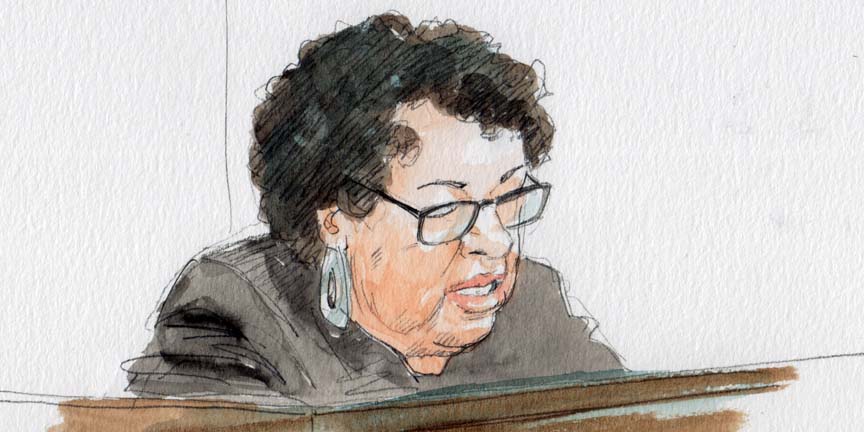Opinion analysis: Fabricated-evidence claims accrue only on favorable termination of prosecution


A six-justice majority held Thursday in McDonough v. Smith that the three-year statute of limitations on a constitutional claim under 42 U.S.C. 1983 alleging that a prosecutor fabricated evidence in a prosecution begins to run when that prosecution terminates in favor of the criminal defendant/Section 1983 plaintiff. Under that standard, the claim of the petitioner Edward McDonough, brought less than three years following his acquittal for election-related fraud, was timely.
Respondent Youel Smith prosecuted McDonough, a former election official, for fraud arising from a primary election; the prosecution was initiated and continued on allegedly fabricated evidence, fabricated affidavits, false testimony and faulty DNA analysis. McDonough was indicted and tried twice, the first trial ending in a mistrial and the second ending in an acquittal. Less than three years after the acquittal, McDonough filed an action in federal district court alleging malicious prosecution and fabrication of evidence before the grand jury and at the two trials, in violation of the Fourth, Fifth, Sixth and 14th Amendments. The U.S. Court of Appeals for the 2nd Circuit dismissed the fabrication-of-evidence claim as untimely, because the statute of limitations began to run when McDonough became aware of the use of fabricated evidence, which occurred well before his acquittal and thus more than three years before he filed the federal civil action.
Justice Sonia Sotomayor wrote for a majority of Chief Justice John Roberts and Justices Ruth Bader Ginsburg, Stephen Breyer, Samuel Alito and Brett Kavanaugh, reversing the 2nd Circuit.
Although the limitations period presumptively runs from the point at which the plaintiff has a complete and present cause of action, some claims may not realistically be brought while the violation is ongoing, allowing for a later accrual date. The majority began by identifying the specific constitutional right alleged to have been infringed, which was problematic because McDonough did not identify a particular constitutional provision or right. But the 2nd Circuit treated the claim as alleging a violation of procedural due process — the right not to be deprived of liberty (in pretrial restrictions on his travel and movement) on the basis of fabricated evidence. The majority assumed, without deciding, that this articulation of the right was sound and considered the limitations question on that basis; it left for another day questions about other constitutional rights that might be violated by a prosecutors fabricating evidence independent of any loss of liberty, such as harm to reputation or the substantive due process right not to be subject to conduct that shocks the conscience.
So defined, McDonoughs constitutional claim was analogous to the common law tort of malicious prosecution, which accrues only on favorable termination of the underlying criminal proceeding. Malicious prosecution requires a showing that the defendant initiated a criminal proceeding for an improper purpose and without probable cause. The essentials of McDonoughs due process claim were similar — he was deprived of liberty through a prosecutors malfeasance in fabricating evidence. Both claims challenged the integrity of criminal prosecutions undertaken pursuant to legal process.
The majority must follow the analogy where it leads. A plaintiff could not bring a malicious-prosecution claim prior to favorable termination of the criminal proceedings, so McDonough could not bring his fabricated-evidence claim until favorable termination of the criminal proceedings. This favorable-termination requirement is rooted in pragmatic concerns about avoiding parallel criminal and civil litigation over the same subject matter and the related possibility of conflicting civil and criminal judgments, and about precluding the use of Section 1983 to collaterally attack state convictions. Because a successful Section 1983 claim would necessarily imply the invalidity of the criminal proceedings against him, although he had not been convicted, a plaintiff must show that the proceedings were not valid. The majority also focused on the practical problems that a different rule would create, in putting criminal defendants to the Hobsons choice of allowing constitutional claims to lapse or filing civil actions against the government officials who are prosecuting them while the prosecution is ongoing; the former is undesirable, the latter fraught with peril. In all, the majority argued, the accrual rule we adopt today, by contrast, respects the autonomy of state courts and avoids these costs to litigants and federal courts.
Justice Clarence Thomas dissented, joined by Justices Elena Kagan and Neil Gorsuch, arguing that the case should have been dismissed as improvidently granted. Because the parties could not identify the specific constitutional right asserted and because the parties did not accept the lower courts description of the claim, it was impossible to identify the contours of the right to determine the proper accrual rule. It was inappropriate to skip the threshold questions of the identity, nature, and elements of the constitutional claim and jump into deciding when the undefined claim accrued. The case thus offered a poor vehicle for resolving the legal issues.
Posted in Merits Cases
Cases: McDonough v. Smith
